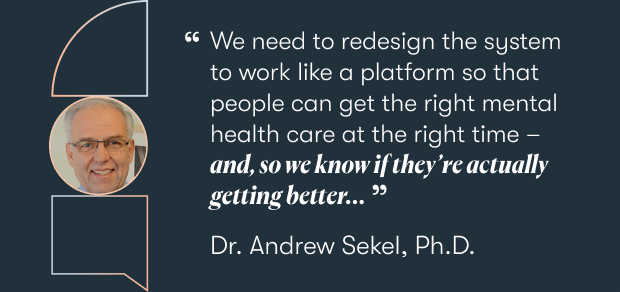
This article features text, audio and video of a recent interview between Dr. Andy Sekel, Ph.D., the Managing Partner at Marketplace Funds and former Chief Executive Officer for Optum Specialty Networks, and Twill's SVP of Healthcare Strategies, Brendon Kelly.
The complete interview with Dr. Sekel was published here, in May.
This excerpt outlines the limitations of our traditional behavioral healthcare system, and how to solve those problems differently by rebuilding the system to work like a platform.
Interview Excerpt Transcript
|
Brendon Kelly: I talk to employers all day, and a lot of them are happy with their EAP, regardless of whether their utilization is extremely low. Others seem to think that they've already taken a digital first approach by investing in some of these Behavioral Health point solutions, or even a re-imagined sort of EAP with the digital component. So, my question then is,"how does this approach that you're describing, really differ from what we already see happening and what employers are telling me that they already have?" Dr. Andy Sekel, Ph.D.: I'll try to diagram it in a visual way: the system I'm talking about is a platform. Platform means interoperability, right? So that information flows—appropriate information, HIPAA regulated information—flows in the system so that we have a clear understanding of how someone is doing. Second, I think point solutions that don't tie into a platform and exchange information and participate in the care of that individual are exactly what they're called. They're point solutions. And what I wrote this article, I was thinking, you know, where in the process of plugging in point solutions, it's almost like, you know, and then there's a leak in the dyke here. I'm going to plug my finger in there. There's this point solution. It doesn't change the structure. What changes the structure is to think of mental health as a highway, someone comes in to this highway or this roadway with a set of issues that they're trying to get some help with. And we do assessment with them at the very beginning, and it's a digital assessment, so they don't have to wait two, three weeks to get an assessment. And the focus of the assessment is to pick the right place for them to get care. So, imagine this roadway having a number of exits. One exit could be the EAP, one exit could be a digital healthcare company that focuses on behavioral health. Another might be an individual practitioner. But the point is to do an assessment that allows you to think about what is the best solution for this person, and then continue to track them in a way that allows them to get help. So I'll give you a couple of examples: If someone comes into this roadway and they say they have all of a sudden, some mild anxiety, because something's happening at work that concerns them, but they want to deal with the anxiety we might, if it's appropriate, just refer them to a digital solution that can get them help very quickly and can get them intermittent help, so that they can frequently make contact either digitally or by phone or by video with someone for relatively short little sessions that actually focus on their ability to cope and their ability to enhance their resilience. We might have someone else coming in that has some very serious depression and has lost weight, is having difficulty getting out of bed, is having difficulty at work, has thought of ending their life. For that individual, we want them in a much more urgent, in -person kind of care. We don't want them, initially, in digital care. They might come back around to get some digital care, but the whole purpose of the platform is interoperability. Good assessment and then good placement of individuals where they can get the best possible help in the long run. |
If this interview was compelling for you, we invite you to join us on June 30. Dr. Sekel is hosting a webinar featuring Mike Thompson, President & CEO of the National Alliance of Healthcare Purchaser Coalitions; Steve Blumenfield, Head of Strategy and Innovation, Health & Benefits NA, for Willis Towers Watson; and Dr. Stuart Lustig, National Medical Executive for Cigna Behavioral Health.
You May Also Like:
- Dr. Andrew Sekel's Editorial: A Digital First vs. Digitally Enhanced Approach to Behavioral Health
- The complete audio interview with Dr. Sekel: Where Mental Health Still Misses the Mark
- Download Our Guide: How (and Why) to Implement Digital First Behavioral Health Solutions

